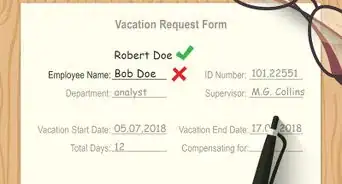This article was co-authored by wikiHow Staff. Our trained team of editors and researchers validate articles for accuracy and comprehensiveness. wikiHow's Content Management Team carefully monitors the work from our editorial staff to ensure that each article is backed by trusted research and meets our high quality standards.
There are 7 references cited in this article, which can be found at the bottom of the page.
This article has been viewed 68,897 times.
Learn more...
Growing up is tough and your teenage years are among the toughest. Taking a self-sufficient, low maintenance approach to these years makes you a helpful and polite person, and also helps the people who are close to you live their lives easier. Here’s how to keep your head down, stay out of trouble and keep your family sane as you navigate the challenging years between 13 and 19.
Steps
Excelling in School
-
1Get enough sleep. If you don’t get enough sleep the night before, you will find it difficult to pay attention and stay awake in class or at your job. Go to bed at a reasonable time to ensure you sleep well. Anywhere from 7 to 9 hours of sleep is a good goal.
-
2Get to school, college or work on time. Missing the bus or leaving the house too late makes you late for class and may force your parents to have to drive you to school, college, university or work. Wake up on time and have a backup plan that doesn’t involve your parents or anyone else you live with.
- Don’t use the snooze button. Don’t risk sleeping through the subsequent alarms. Any sleep gained through the snooze function is not quality sleep.
- Set the alarm for the last possible moment. Eradicate the ability to snooze or dawdle by setting your alarm so that you only have just enough time to prepare to leave the house in the morning.
- Get a loud alarm. The alarm needs to be loud enough so that you don’t ignore it while sleeping. Rain or other ambient noises will also mask low alarm volumes.
- Move the alarm out of reach. Place the alarm across the room to force yourself to stand up and walk to turn it off.[1]
Advertisement -
3Pay attention in class or any other learning environments. Paying careful attention earns understanding. You’ll need little help outside of the classroom or anywhere else if you do everything you can to pay attention.
- Sit in the front of class. It is easier to pay attention and harder to slack off if you are at the front of the classroom. Ask the teacher if you can move closer to the front if you have assigned seating arrangements.
- Sit up straight. Proper posture increases blood flow and oxygen to the brain, keeping you alert.
-
4Take notes. Writing down notes helps reinforce information in your memory and helps you follow the lesson. Typing notes also works - ask your teacher if devices such as laptops are allowed.
-
5Ask questions if you don’t understand a concept. There is no shame in asking a question if you need clarification on a topic. Ask the teacher after class if the question is complex, or if you don't want to ask during class.
-
6Do your homework. Homework reinforces the information you were taught in class and builds the research and review skills that are important all throughout life. Make homework a priority when you return from class.
- Do homework at the same time every day. Regiment your homework so that it becomes a part of your routine – you’ll approach homework with less trepidation.
-
7Take note of your deadlines. Prioritize your school work and other goals, including homework and projects, based on due dates and the amount of work required.
- Write them in a planner if necessary. Larger work, such as book reports, require a longer, structured approach.
-
8Use free time to your advantage. Use car or bus rides, lunch or other breaks in routine to squeeze in extra work. Even briefly reviewing your notes can help you prepare for homework or tests.
-
9Join a study group. Look into whether your school offers study group sign ups or after-class tutoring. If you can attend, both help test your knowledge and shore up any lack of understanding you have. Studying with local friends also helps, but make sure you stay on task.[2]
Helping Around the House
-
1Do chores or housework as required. Chores aren’t meant to punish you. Your parents do a lot to keep food on the table and a roof over your head. Look at chores as a way of thanking your parents for what they do for you every day. It takes work out of their hands and gives them some rest.
- Write down your chore list on a piece of paper or spreadsheet and hang it somewhere as a reminder. This helps keep the chores on your mind throughout the week.
- Make a game out of chores. Gamifying chores helps provide the motivation needed to get the task in question done. Several cell phone apps now exist that help manage tasks such as chores while providing a fun sense of progression when you complete your goal.[3]
-
2Offer to help prepare meals and with cooking in general. Cooking is a time-consuming, multi-step process that can always benefit from an extra hand or two. Help cut vegetables, boil the water or even read the recipe.
- Pick a day or two out of the week to take care of the entirety of dinner. Even if your cooking skills aren't polished, your family will appreciate a work-free meal.
-
3Clean up after yourself. Be mindful of the mess you make around the house and strive to keep tidy. There are numerous small ways of keeping clean that can add up.
- Close the toilet seat lid when done. Clean up any mess that may have occurred at this time.
- Keep your dirty clothes in the hamper or a specified clothes bin. Clothes strewn about the floor are uncleanly and contribute to an overall untidy room. They can also obstruct movement and cause tripping or other hazardous accidents.
- Clean your dishes when you are done with them. If you have a dishwasher, rinse your dishes and place them in the dishwasher as soon as you are finished.
- Put items back where they belong. Return books, magazines, television remotes and any item not strictly yours back where you found it when you are done.
-
4Take care of your pets. Cats, dogs, rabbits, gerbils etc require a high level of care and attention. Share the responsibility of watching over them by feeding them, walking them or cleaning up after them as necessary.
- Combine pet responsibilities with your chore list if it helps you remember to perform them.
- Remember that while a room can stay dirty for an extra day, an animal’s needs cannot be postponed.
-
5Dress low maintenance. Opt for a simple but stylish appearance if your parents still help pay for your clothes. Designer brands are particularly expensive and burdensome if you have siblings who need clothes as well.
- Purchase accessories for their purpose, not their looks. Items such as bags or purses perform the same, no matter how they look.
- Grooming items such as deodorant and makeup are also available for cheap, without sacrificing quality. Visit your local drugstore and test for quality before purchasing.
Having a Safe Social Life
-
1Find your own transportation. Bike, walk, drive or bus to your destination to save your parents the trouble of constantly driving you places. Ask your friends who drive if you can catch a ride from time to time. That’s what friends are for!
- Many cities have bike lanes for commuting. Check with your state or location's Department of Transportation website to map out where bike lanes are available near you. Be careful when planning – some areas or routes only partially support bike lanes. Always wear your helmet.
- Bus routes are available on your state’s Department of Transportation website. Make sure you bring enough money to cover fare. Pay attention to bus schedules – don’t miss the last bus that runs for the day.
- Use the metro if available in your city. A combination of metro and bus travel can take you far, provided you have the proper fare. Pay attention to the metro schedule. Like the bus, the metro stops running at certain hours of the day.
- Download a route planner app. These apps help you plan out which public transportation to take for greatest efficiency and are conveniently located on your cell phone.
-
2Get a cell phone. Family plans are available from many carriers and often a great value for your whole family. Charge your phone overnight so that you can always use it when necessary. Store important numbers in your cellphone in the event of an emergency. Some numbers to include:
- Your family members.
- The local police department.
- The local fire company.
- Poison control.
- Your doctor.
- Nearby hospitals.
- Teachers.
- Friends.[4]
-
3Get a job, full time or part time as appropriate to your age. A part-time job offers extra spending money while keeping you out of trouble. Make sure your job fits your existing schedule and transportation capabilities.
- Don’t work more than 15 to 20 hours a week at your job unless it's you are not studying. Leave enough time for your academic responsibilities.
- Know the work rules of your age group. If you are 14 or 15 years old, you may work only three hours or less on school days and only between 7 a.m. and 7 p.m.
- Teens 16 and over may work unlimited hours, but are barred from working jobs deemed hazardous by the Secretary of Labor (such as construction) in some locations.
- Let your employer know of your scheduling requirements prior to taking the job to make sure the job is a good fit.[5]
-
4Stay away from drugs. Alcohol, weed and other drugs cost money and impact your mental and cognitive faculties, even if for a brief time. Don’t allow bullying or peer pressure to cause you to make decisions that are not your own.
- Turn to resources such as D.A.R.E. if you feel pressured by the presence of drugs at your school or neighborhood.[6]
- Tell your parents or teachers if others are pressuring you to engage in drug-related activities.
-
5Join an after school activity. Sports are a great way of blowing off steam and getting exercise, provided they can fit into your scheduling and transportation capabilities. Other clubs, such as band or chess, can help you meet like-minded individuals who can relate to the challenges life throws your way.
-
6Manage your stress. Being a teen is hard! There will be moments when the pressure of school, your friends, your parents and your future become difficult to handle. Remember to step back and de-stress to regain your composure.
- Take a walk. Go outside, get some fresh air and give your brain a break from all that stress.
- Meditate. Deep breathing and mindful thinking help reduce stress while putting you in touch with how you are feeling in the moment.
- Make a change. Determine if a particular item is causing you stress. Change how you approach that item, or remove it entirely if possible.[7]
Warnings
- Safe sex is very important for all those old enough for legal sexual relationships. Don't contract an STD or become a parent unintentionally.⧼thumbs_response⧽
References
- ↑ http://www.webmd.com/sleep-disorders/features/trouble-waking-up
- ↑ https://bigfuture.collegeboard.org/get-started/inside-the-classroom/take-control-of-homework#
- ↑ http://www.businessinsider.com/quest-app-chores-video-game-quests-2015-4
- ↑ http://preparednessmama.com/emergency-numbers-to-have-in-your-cell/
- ↑ http://education.cu-portland.edu/blog/news/high-school-student-jobs/
- ↑ http://www.dare.com/
- ↑ http://www.everydayhealth.com/emotional-health/strategies-for-de-stressing.aspx













-Step-12-Version-2.webp)

































































